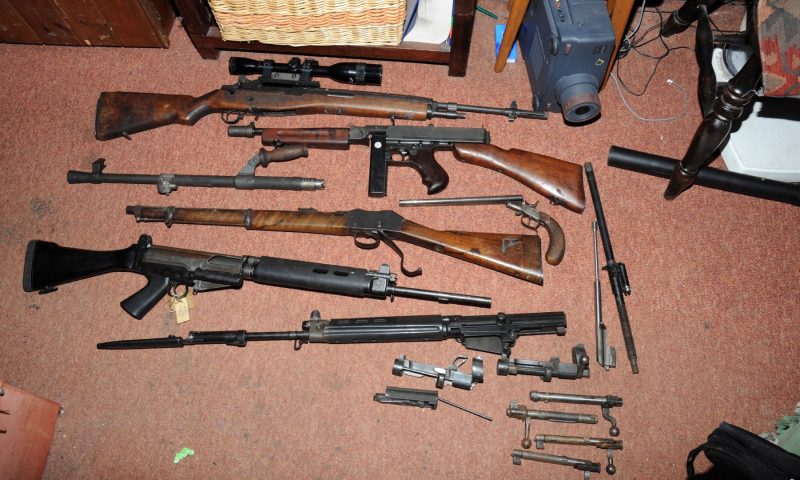In 2014, police found 463 illegal firearms in the home of James Arnold, a crane operator and parish councilman who lived in the village of Wyverstone, Suffolk, England. It is the largest hoard of illegal weapons ever uncovered in the U.K. Included in the collection were rifles, machine guns, an anti-tank missile, and 200,000 rounds of ammunition.
Arnold passed away from cancer before he could face trial, but gunsmith and firearms dealer Anthony Buckland of Stoke Holy Cross, Norfolk, faced trial late last year. One illegal firearm in Arnold’s collection had been supplied by Buckland. He was found guilty of 11 counts of selling a prohibited weapon and 9 counts of fraud.
Jailing him in February, the judge, Stephen Holt, said: “When the police searched Jim Arnold’s home they found a vast collection in a secret room which could only be accessed by crawling through a safe.
“But you are to be sentenced for what the jury convicted you, of and not the vast collection of firearms that Mr. Arnold had. In your profession, a great deal of trust had been placed in you and it is quite clear you abused that trust.”
Buckland, 65, is in poor health. He visibly shook when the sentence was passed.
Three months after the discovery of the weapons and his arrest in April 2014, Arnold died of pancreatic cancer and was never prosecuted. As Buckland was jailed, the police allowed journalists to see the full extent of the cache.
Ch. Supt. David Skevington said, “James Arnold never offered any explanation for what he did; he simply said he had come by the weapons years ago and kept them safe to stop them causing any harm.
“We have asked every question and followed every line of inquiry and have found no evidence of a criminal or terrorist motive. The best explanation to date is that he was a collector and a hoarder who collected these weapons in the way some people collect stamps.”
On April 13, 2014, officers first went to Arnold’s residence on a single-track lane with only three other houses and a farm nearby. They intended to revoke his license for 17 weapons to prevent him from using them after a domestic violence incident was reported on his property. When they arrived, they found other illegal weapons on the floor of the living room. Britian has very strict laws on gun ownership.
During their investigation, they realized that the outside dimensions of the house did not match the inside dimensions. A search uncovered a secret room that could only be accessed through a narrow tunnel hidden behind a false wall in his pantry.
The police took 27 days to investigate the house, working with bomb inspectors in case it was booby trapped.
The find is by far the largest ever cache of illegal firearms ever found in the U.K. One of the next largest finds is believed to be 31 rifles and machine pistols found with 1,000 rounds of ammunition on a boat at Cuxton Marina on the river Medway in Kent in August of 2015.
Arnold’s home includes an eight-acre field which he surrounded with a large wall made of railroad ties. Police believe Arnold may have used it as a homemade firing range.
Arnold had an interest in firearms since his childhood and was a member of several shooting clubs. He had a firearms certificate since 1984 and was known to shoot deer and rodents.
His license contained a clause that subjected him to regular pre-announced police checks. There had been no cause for suspicion that would have led to an unannounced visit until 2014.
He lived at home with his wife and daughter. Although he was chairman of the parish council at the time of his arrest and was active in running the village hall, he was described as a private man.
One village resident said, “He was involved in lots of things and lots of people knew who he was. But at the same time, you never felt like you really knew him – he never revealed very much about himself. He seemed like a nice enough man but he was a collector of almost everything; he also had odd bits around his property.”
Experts from the National Ballistics Intelligence Service examined many of the weapons but found no links to known crimes. Arnold’s cache contains modern, military-style weapons, but many of the guns are considered museum pieces dating back to the First and Second World Wars.
Arnold originally gave no comment to the police. Later, when interviewed in prison, he offered a limited explanation for his collection.
“He seemed very set on the idea he was keeping people safe by looking after these weapons,” Skevington added.
“He certainly didn’t see himself as a danger to others. But by the time we came across him, his life seemed to be deteriorating. Of course, the fear was that they could fall into the wrong hands or, given that he had terminal cancer, something might change in his life and he would have access to hundreds of deadly weapons.”
Buckland was only prosecuted for supplying one weapon to Arnold but police say that 16 total firearms of those found at Arnold’s home were supplied by him.
Michael Claire, litigating for Buckland, said: “He cannot be responsible for Mr. Arnold’s collection and whatever else Mr. Arnold had is a matter between him and the police.”
Many of the weapons Buckland supplied to Arnold and other customers were illegal weapons that he thought he had converted to make legal.
“He stands before Your Honour as an utterly broken man,” Claire added. “He is broken financially, he has lost his reputation and his lifelong association with firearms is over. He will never deal in firearms again, he will never handle firearms again – and he doesn’t want to.”
